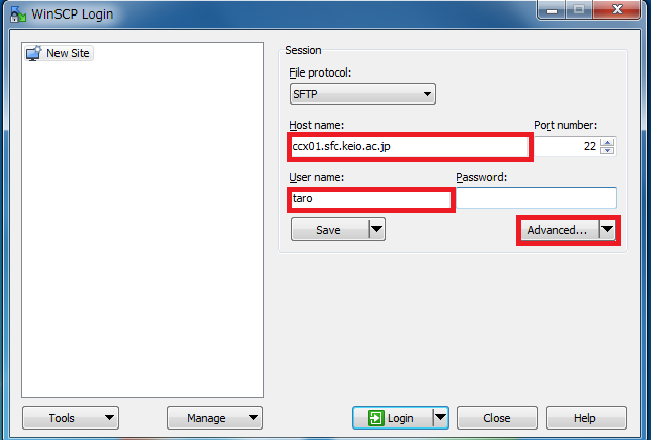Generate Ssh Key In Winscp
Protecting SSH keys. SSH keys are used for authenticating users in information systems. The SSH keys themselves are private keys; the private key is further encrypted using a symmetric encryption key derived from a passphrase. The key derivation is done using a hash function. Passphrases are commonly used for keys belonging to interactive users. Apr 26, 2016 WinSCP Download - Demo how to import an OpenSSH formatted Private and Public Key Pair into WinSCP for use with SSH and SFTP. Mar 27, 2019 In order to generate a signature, WinSCP must decrypt the key, so you have to type your passphrase. This can make public-key authentication less convenient than password authentication: every time you log in to the server, instead of typing a short password, you have to.
Several tools exist to generate SSH public/private key pairs. The following sections show how to generate an SSH key pair on UNIX, UNIX-like and Windows platforms.
Generating an SSH Key Pair on UNIX and UNIX-Like Platforms Using the ssh-keygen Utility

UNIX and UNIX-like platforms (including Solaris and Linux) include the ssh-keygen utility to generate SSH key pairs.
The critical feature of Windows 7, however, is its firewall, which has become more secure and outbound firewall rules than ever before. Cd key windows 7 generator. Download Setup Windows 7 Professional Product Key 2019 With Crack (32/64 Bit)Windows 7 Professional Product Key 2019 is the 25 digit number which is required to activate Windows 7 that is less time. Image effects are known to be incredible and incomparable desktop navigation is also intriguing. It is introduced specifically for students. Windows 7 Professional has enhanced photo slide show movies and features that help you enjoy playing HD movies in the media center of the window. However, a powerful upgrade feature is available and the new Windows 10 allows you to update directly from Windows 7 to the latest version and the new Microsoft Windows 8 world.In addition to enhancements, Windows 7 Professional Product Key is also possible to experience all other features that can be found in Windows 7 Home Premium.
- Navigate to your home directory:
- Run the ssh-keygen utility, providing as
filenameyour choice of file name for the private key:The ssh-keygen utility prompts you for a passphrase for the private key.
- Enter a passphrase for the private key, or press Enter to create a private key without a passphrase:
Note:
While a passphrase is not required, you should specify one as a security measure to protect the private key from unauthorized use. When you specify a passphrase, a user must enter the passphrase every time the private key is used.
The ssh-keygen utility prompts you to enter the passphrase again.
- Enter the passphrase again, or press Enter again to continue creating a private key without a passphrase:
- The ssh-keygen utility displays a message indicating that the private key has been saved as
filenameand the public key has been saved asfilename.pub. It also displays information about the key fingerprint and randomart image.
Generating an SSH Key Pair on Windows Using the PuTTYgen Program
The PuTTYgen program is part of PuTTY, an open source networking client for the Windows platform.
Winscp Ssh Server
- Download and install PuTTY or PuTTYgen.
To download PuTTY or PuTTYgen, go to http://www.putty.org/ and click the You can download PuTTY here link.
- Run the PuTTYgen program.
- Set the Type of key to generate option to SSH-2 RSA.
- In the Number of bits in a generated key box, enter 2048.
- Click Generate to generate a public/private key pair.
As the key is being generated, move the mouse around the blank area as directed.
- (Optional) Enter a passphrase for the private key in the Key passphrase box and reenter it in the Confirm passphrase box.
Note:
While a passphrase is not required, you should specify one as a security measure to protect the private key from unauthorized use. When you specify a passphrase, a user must enter the passphrase every time the private key is used.
- Click Save private key to save the private key to a file. To adhere to file-naming conventions, you should give the private key file an extension of
.ppk(PuTTY private key).Note:
The.ppkfile extension indicates that the private key is in PuTTY's proprietary format. You must use a key of this format when using PuTTY as your SSH client. It cannot be used with other SSH client tools. Refer to the PuTTY documentation to convert a private key in this format to a different format. - Select all of the characters in the Public key for pasting into OpenSSH authorized_keys file box.
Make sure you select all the characters, not just the ones you can see in the narrow window. If a scroll bar is next to the characters, you aren't seeing all the characters.
- Right-click somewhere in the selected text and select Copy from the menu.
- Open a text editor and paste the characters, just as you copied them. Start at the first character in the text editor, and do not insert any line breaks.
- Save the text file in the same folder where you saved the private key, using the
.pubextension to indicate that the file contains a public key. - If you or others are going to use an SSH client that requires the OpenSSH format for private keys (such as the
sshutility on Linux), export the private key:- On the Conversions menu, choose Export OpenSSH key.
- Save the private key in OpenSSH format in the same folder where you saved the private key in
.ppkformat, using an extension such as.opensshto indicate the file's content.